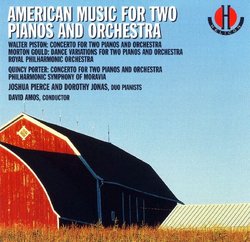| All Artists: Royal Philharmonic Orchestra;Joshua Pierce;Dorothy Jonas Title: American Music for Two Pianos and Orchestra Members Wishing: 0 Total Copies: 0 Label: Helicon Records Release Date: 11/30/1999 Album Type: Single Genre: Classical Styles: Chamber Music, Forms & Genres, Concertos, Historical Periods, Classical (c.1770-1830), Instruments, Keyboard Number of Discs: 1 SwapaCD Credits: 1 UPC: 060550104429 |
Search - Royal Philharmonic Orchestra;Joshua Pierce;Dorothy Jonas :: American Music for Two Pianos and Orchestra
 | Royal Philharmonic Orchestra;Joshua Pierce;Dorothy Jonas American Music for Two Pianos and Orchestra Genre: Classical
|
Larger Image |
CD Details |
CD ReviewsA highly enjoyable and coherent recital of rare Two-Piano Co Discophage | France | 01/29/2008 (5 out of 5 stars) "The label, Helicon, is less than candid about these recordings, giving only a copyright date of 1999. But I'd be very surprised that the performers, pianists Pierce and Jonas and conductor David Amos, went back to re-record Piston's Concerto and Morton Gould's Dance Variations, with the Royal Philharmonic, ten years after the recording that was released by Koch International in 1990 (Gould: Dance Variations / Piston: Concerto for Two Pianos / Copland: Music for Two Pianos). The timings given by Koch were deceptive, as they differ, sometimes substantially, from those of Helicon, but as it turns out, Koch's timings were inaccurate: they are the same recordings, made in London on July 24 & 25, 1989.
The complement on Koch was a series of two-piano pieces by Aaron Copland, which I wasn't very enthusiastic about, and they didn't come in very good sound either. So the Helicon reissue is much to be preferred, thanks to the more coherent (stylistically and historically) inclusion of Quincy Porter's "Concerto Concertante" for Two Pianos, a Pulitzer-Price winner in 1954, here recorded with the Philharmonic Symphony of Moravia. I became interested in Porter when I heard his Blochian Second Violin and Piano Sonata, recorded by Louis Kaufman (Louis Kaufman plays Still, Bloch and Porter). Quincy Porter (1897-1966) is fairly forgotten nowadays. He was one of the foremost representatitves of the academic establishment, being tought at Yale (and also by Vincent D'Indy in Paris and Bloch in Cleveland) and ending his career there as a faculty member - he was also one of the staunchest opponents of Hindemith when the German composer taught there after the war, which doesn't speak much in his favor. I've reviewed Porter's two Symphonies (Quincy Porter: Symphony No. 1; Poem & Dance; Symphony No. 2) and found them well-crafted but ultimately lacking personality - maybe the reason why he loathed Hindemith so much, who had so much (personality) to spare. Still, I was sufficiently interested in his Pulitzer-prize winning composition (and attracted by the cheap price demanded for it) to want to replace my Koch disc with the Helicon release. It turns out that Porter's 15-minute Concerto is a pleasurable work that fits well stylistically with Piston's Concerto: again it lacks a distinctive personality but it does have an enjoyable neo-classical clarity and vigor, at times vaguely reminiscent of Copland's masterful Piano Sonata. The orchestra has slightly more sonic presence than in the earlier, RPO recording, and, as there, there is a fine stereo definition between both pianos. On re-hearing Pistons Concerto from 1958 I hear much more than I did on first hearing the Bartok similitudes in the first movement and not only the finale (Bartok's Second Piano Concerto especially) and the Hindemith ones (in the slow movement) along with the Stravinsky ones (the neo-classical Stravinsky of the Piano Concerto and Capriccio and Concerto for Two Solo Pianos). Here too the work's neo-classical vigor and powerful lyricism make it a highly enjoyable composition, and it is incredible that this was only its first recording. As I wrote in my review of the original Koch release, Morton Gould's Dance Variations for Two Pianos (1953) is a substantial piece in length, clocking nearly 25 minutes, if not in character, but it has all the hallmarks of its composer at his most brilliant and humoresque: the colorful orchestration, the syncopated cool Jazzy rhythms turning to Latin-American dance then into a take-off of a Bach chorale-prelude (in the first movement, "Chaconne"), the tongue-in-cheek humor in the second movement, with what I hear as brash take-offs from Ravel's Valse (3:25), then Offenbach's famous Can-Can (4:03) (which incidentally wasn't a Can-Can when first composed, for Orpheus in the Underworld, as that dance form did not yet exist). I also hear traces of Prokofiev (3rd Piano Concerto, Romeo & Juliet) both in the Gavotte from the second movement and in the colors of the sweet and soft Pas de Deux (Tango), and there is a boisterous and foot-lifting finale (Tarantella) starting like Ravel's Concerto in G but with a more sardonic, scherzo orchestration and march tunes. Nothing essential here but lots of fun. The rarity and interest of the three compositions, as well as the stylistic (in the case of Piston and Porter) and historical (all composed between 1953 and '58) coherence of the program make this a highly enjoyable disc. TT is an acceptable 58-minutes. My previous Koch CD goes to the "for sale" box. " |

 Track Listings (8) - Disc #1
Track Listings (8) - Disc #1